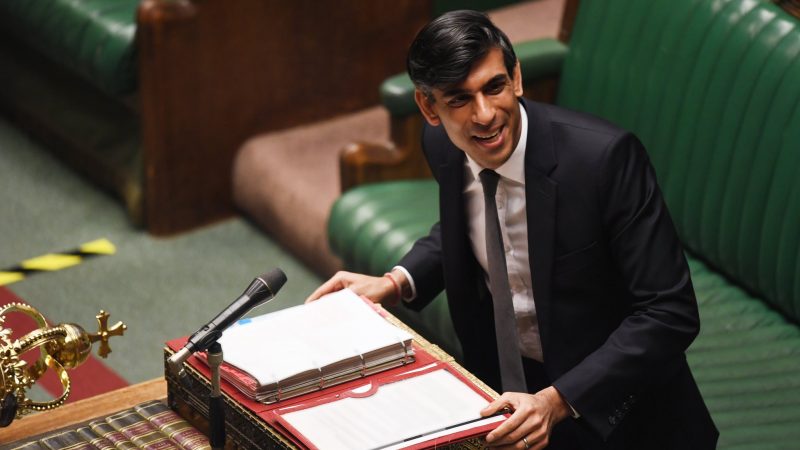
When Rishi Sunak gets up to deliver the Spring Statement on Wednesday, he will be delivering yet another economic update to a nation facing difficult times. Having gotten through the worst of the pandemic, people across the country will be expecting the government to rise to the moment: great challenges demand bold and radical interventions.
The Chancellor’s immediate priority must be to protect households from the rapidly escalating cost-of-living crisis. Figures released last week showed that wages are already lagging behind prices, falling by 1.6% over the past year. Workers are facing a double punch next month, with energy bills set to jump by £693 just as the National Insurance increase takes another £20 out of the median monthly pay packet. Research from the Resolution Foundation suggests that the typical household could see their income fall by £1,000 compared to last year – a drop only previously seen in recessions. Russia’s illegal war on Ukraine threatens to push inflation above 8%, driven by soaring commodity prices.
This living standards crisis threatens workers at every income level. As well as addressing the hardship facing households receiving Universal Credit, the Chancellor must find ways to offset the impact of surging costs on the budgets of middle earners and the self-employed. This might include postponing the National Insurance hike – the economic climate has drastically shifted since it was first announced in September, and an assessment must be made of the wisdom of further choking consumer demand.
Having announced the end of the public sector pay freeze in October’s Budget, the Chancellor must now make good on that promise and give public servants a proper pay rise that recognises the radically different situation workers find themselves in today. No-one will be fooled by a below-inflation pay rise: the pay freeze cannot be succeeded by yet another pay cut.
Those are the immediate, urgent measures required to shield households from the worst of the current economic environment. But the Spring Statement must offer more than quick short-term fixes: the Chancellor must seize this moment to build the high productivity, high wage economy that the government has promised. Technological competitive edge won’t come about by wishful thinking – it will be forged by strategic investment in industry, skills and social partnership.
This will require public investment in the industries of the future to give the private sector the confidence to throw its own resources behind UK R&D, skills, new technology and essential infrastructure. UK firms lag overseas competitors on every count, dragging down our productivity and ultimately our quality of life. The Chancellor was right to recognise this in his Mais lecture last month – but now we need a plan to stop the numbers moving in the wrong direction. Employers and unions stand ready to shape the strategy to get investment flowing into industries critical to the future of our economy and our country: tech, telecoms, renewable and nuclear energy, defence and our creative industries.
This means ensuring the skills and strategic capabilities found in companies like semiconductor designer Arm is built on, not damaged by financial short-termism; and that increases in defence spending translate into British jobs and industrial capacity – with contracts for projects like the Fleet Solid Support ships giving priority to bids that see ships designed and built here in the UK.
Achieving this step change in private sector investment will only be possible if there are valued, expert public servants enabling and contributing to private sector growth and productivity by pushing forward cutting-edge scientific research, devising and implementing responses to the environment, social, technological and security challenges of our time. Valuing these dedicated experts means paying them properly and reducing the gap between their stagnated salaries and their earnings potential in the private sector. If you want the best, you need to pay for it.
Underpinning this revived industrial and economic strategy needs to be a seat at the table for workers and all the more so, since the dreadful behaviour of P&O yet again laid bare the deficiencies of UK employment law. All of the available evidence – here in the UK and around the world – shows that engaging the expertise, insight and commitment of working people is key to accelerating innovation, countering short-termism, raising productivity and ensuring that proceeds are shared fairly through sustainable growth in real wages. This has been essential to the development of the most globally successful firms and industries of Western and Northern Europe – as recognised by the OECD, IMF, academics and think tanks.
The response to Covid-19 showed that the government can work with unions to think creatively and respond quickly and decisively to avert an economic crisis. Now facing a new crisis, the Chancellor needs to work with unions once again, bringing employee representatives onto strengthened industrial councils and demanding greater engagement from employers with those who work for them.
The Chancellor has the opportunity to build the foundations of a British economy fit for the future: one that is ready to compete globally in the industries of the future, with workers reaping the rewards. He must not waste it.




More from LabourList
‘Labour’s quiet quest for democratic renewal’
‘Labour promised to make work pay. Now it must deliver for young people’
‘Council Tax shouldn’t punish those who have the least or those we owe the most’